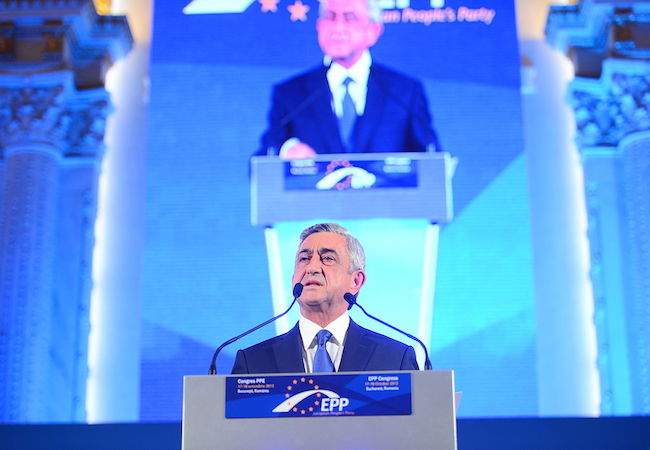
Years on, independent Armenian political analysts suggested that Armenia was gradually releasing its independence to Moscow. Although the Armenian public reluctantly agreed with them, the people never protested the government’s policies of overly intimate relationship with Moscow. At least on a palpably large scale.
That may have changed earlier this winter when a serviceman from Russia’s 102nd military base in Gyumri, Armenia went on an abrupt shooting rampage against an Armenian family of seven, killing six instantly and leaving the surviving infant severely wounded. The baby would die just a few days later. Valery Permyakov, an ethnic Russian and a deserted soldier, attempted an escape through the Turkish-Armenian border after the massacre, but was caught by the Armenian law enforcement before he could disappear.
However, the anger among the locals was not necessarily due to the criminal activity of the Russian. It may have been perceived as just another crime. What really aggravated the Armenian public was the fact that Permyakov was passed to the Russian military base and had been in their custody ever since, at the insistence of Moscow. He would be tried by the Russian military court, it was announced, not Armenia’s criminal court. This, in turn, sparked series of public rallies not only denouncing the decision of the Armenian government to bow to the will of Russian military, but also questioning Armenia’s intimate ties with Moscow at the very expense of Armenia’s independence – both political and economic.
Armenian leadership never spoke out criticizing Russia for its stance in the Permyakov case. Instead, the Armenian President told the Armenian public how their country depended on Russia for security against Turkey and Azerbaijan. Serzh Sargsyan also proceeded with the ever controversial policy of Yerevan to integrate with the Eurasia Economic Union. Just a few days ago, he spoke with the Russia’s ‘Россия 24′ TV station acknowledging the importance of the union for Armenia. Sargsyan stated that any economic obstacles that stood between Armenia and Russia “vanished” after Yerevan chose to join the organization.
“We are joining the market of 170 million people, which is a very good achievement for a small Armenia,” the president said. “With our joining the EEU, we have at least removed earlier existing barriers, and the flow of goods, capital and workforce has become much easier now,” Sargsyan said. The Armenian leader must have deliberately ignored the fact that Armenian economy performed rather poorly after his country formally became the member of EEU, largely an effect of US and EU-sponsored sanctions on Russia in the wake of its annexation of Crimea (part of sovereign Ukraine) and military intervention in Donbas region of Ukraine. The EEU is a Moscow-led economic union, which came into being on January 1, 2015. It comprises Russia, Belarus, Kazakhstan and Armenia. Kyrgyzstan is expected to join the union later this year.
During his interview to the Russian television, Serzh Sargsyan also stated that “Armenia wants to coordinate its foreign policy with Russia,” attesting to long years of speculations of Armenian analysts that Armenian independence had started to gradually evaporate due to apparent subjugation of Yerevan’s political course and economic assets to Kremlin.
“If we are joining unions, we are naturally taking on obligations,” he said when asked whether Russia could rely on Armenia’s support in international issues. The president reiterated his wholehearted support for Moscow’s rather aggressive policies in the post-Soviet periphery. Sargsyan was reportedly the first leader – out of a handful – who called to congratulate Vladimir Putin on annexation of Crimea, an integral part of Ukraine in March 2014. His diplomats at the UN General Assembly confirmed Sargsyan’s loyalty to Moscow during UN GA’s vote on Ukraine’s territorial integrity. Armenia was among other 11 states – Russia, North Korea, Sudan, Syria, Cuba, Venezuela, Bolivia, Zimbabwe, Nicaragua, Belarus – to side with Russia, although Yerevan remains as one of the top U.S. aid recipients in the world per capita.
For all these pro-Russian activities of the Armenian government – apart from the sacrifice of its political and economic independence – Sargsyan gets the benefit of Collective Security Treaty Organization (CSTO), under whose terms Moscow obliges itself to defend Armenia in case of armed hostilities, though none are foreseen. The only military engagement Armenia may be drawn into is the Nagorno Karabakh conflict with Azerbaijan. However, Azerbaijan had stated number of times that it would only engage in war with the occupying force on its own territory, that is, Nagorno Karabakh region of Azerbaijan, which is under occupation by Armenian armed forces since 1994. CSTO’s jurisdiction does not extend to Nagorno Karabakh and its force is limited to Armenia’s international borders.




